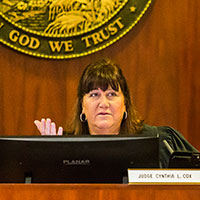 Judge says drug and mental health courts are highly effective
Judge says drug and mental health courts are highly effective
STORY
Circuit Court Judge Cynthia Cox says problem-solving courts here are some of the best in the state, providing an important part of the solution to many of society’s most pressing problems.
Statistics back her up: Recidivism rates in problem-solving courts range from 7 percent to 11 percent as compared to 70 percent in a traditional court setting, said Cox, who handles almost all of the felony cases in Indian River County. “For every dollar you spend on a problem – substance abuse and mental health – you get $7.14 cents back.”
“People come from all over the state to observe our mental health court,” Cox said.
There are 16 specialty court programs in the 19th Judicial Circuit, which encompasses Indian River, Martin, St. Lucie and Okeechobee counties. Services include drug court, veterans court and mental health court.
Unlike traditional court proceedings, problem-solving courts focus on rehabilitation, Cox told a crowd of nearly 100 last Friday at United Against Poverty’s Symposium on Poverty and Justice Reform.
“It’s totally different from the regular court where you are punishing someone – you are encouraging them to do well, providing them with incentives and or sanctions,” Cox said. “It’s an opportunity to help make the person independent.”
Cox, who had formerly practiced family law, was admitted to the bench in 2002, the same year the state was shutting down many of its psychiatric institutions. Funding for community programs intended to provide support to newly-released patients never came to fruition, she recalled.
“These were the sickest of the sick people,” the judge explained. “The unintended consequence resulted in increased homelessness in our circuit, as well as increased police injuries, shootings of people with mental illnesses, [and expenditure of] lots of tax dollars; basically, mental health was made a crime.”
Incarcerating someone who is detoxing or suffering from a mental illness costs three times as much as locking up a standard criminal inmate, Cox told the crowd. Hundreds of millions of dollars have been saved by altering the approach to public safety with the use of problem-solving courts.








